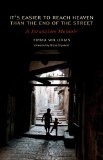Summary | Excerpt | Reviews | Beyond the Book | Readalikes | Genres & Themes | Author Bio

A Jerusalem Memoir
by Emma Williams
“You know, the Israelis, they even make us apply for a permit
to move from one place to another in the West Bank. I cannot go
anywhere, not even Bethlehem, without one. It’s there, Bethlehem,
just over the hill, you can almost see it.There is nothing we can do.
What is the point of anything, even demonstrating? It does no
good at all.”
Daniel walked over to the wall where we were sitting. “How
are things?” he asked, and we talked for a while about the students’
problems getting to class. Daniel and I climbed into the car and
drove away, toward the road to Hebron that Ghassan cannot travel
because he is Palestinian.
To get to Hebron we had to pass through Bethlehem, and
Daniel knew a back way eastward across the dry country. We
wound through narrow streets, passing children and donkeys and
little green tractors pulling miniature trailers. A path led off to the
right down a wadi. I could see the valley below, patches of rebellious
green against the sand, but I couldn’t see where the path went
or why there were so many Palestinians, old, young, suited, robed,
making their way down the hillside.
Daniel and I kept going. There was a checkpoint ahead. A burly
soldier told us that the checkpoint, separating two Palestinian areas
just as Ghassan had described, was closed and no exceptions:
“Security.”Daniel knew the checkpoint had been open that morning
and asked politely if the soldier was sure. Yes, he was sure, and now he
was angry.He thought we were trouble, and started to shout, but then
another man in uniform appeared. Slight, polite, and apologetic, he
spoke in Hebrew to the burly man and told us: “Wait here.” We
waited. It didn’t matter, waiting, we were used to it. Then the slight
soldier motioned us to go through. The burly one had disappeared.
We passed through and curved down the hill on a hairpin
bend. Now I could see where the footpath led: it was the checkpoint bypass. The Palestinians knew they would not be allowed
through the checkpoint so they were walking around it to one of
the yellow taxis waiting on the other side. The old, bent and
leaning on sticks, found the rocky steepness difficult. The young
helped them.
We drove on, through the biblical landscape toward
Bethlehem, into the village of Beit Sahour, now a suburb with
squares of olive orchard and blocks of concrete houses, past the
Shepherds’ Field and Manger Square, doubling back where the
roads were blocked by earth-mounds or trenches dug by the army.
But there was no traffic, the place was still. We drove across the
middle of Bethlehem, past the hospital where I had given birth,
and out again through another suburb-village, Beit Jala, up the hill
and past the church and the well and out to coils of barbed wire:
another checkpoint. Again, it was a checkpoint between two
Palestinian areas, well inside the West Bank.
“You can’t pass. And all of Bethlehem is under curfew.” This
explained the midday quiet of the town. The soldier was very
young indeed. He had his orders not to let anyone through his
checkpoint. But he checked to make sure, at a concrete pillbox just
behind, with more soldiers away to the left watching from under
the drapes of camouflage.
“You cannot pass,” he came back to say. “You have to go back.”
“You’re sending us back during curfew? People get shot for
breaking the curfew.”
“No, we never shoot people for breaking the curfew.The army
doesn’t do that.”We said nothing. It is always better to say nothing.
Anyway, it wasn’t his fault.
We doubled back. Now that we knew about the curfew the
quietness was frightening. Rather than go back into the curfew we
tried the road by the monastery of Cremisan. After the dry earth
west of Bethlehem, Cremisan was green, damp, and fertile. Vines
and terraces fell away below us and rose upward from the narrow
road. Round the curve between stone walls the monastery facade
appeared amid pointing cypress trees.The presence of water seeped
through the green. But this road was blocked as well, three monks
from Europe told us.
Excerpted from It's Easier to Reach Heaven Than the End of the Street by Emma Williams. Copyright © 2009 by Emma Williams. Excerpted by permission of Interlink Books. All rights reserved. No part of this excerpt may be reproduced or reprinted without permission in writing from the publisher.




Being slightly paranoid is like being slightly pregnant – it tends to get worse.
Click Here to find out who said this, as well as discovering other famous literary quotes!
Your guide toexceptional books
BookBrowse seeks out and recommends the best in contemporary fiction and nonfiction—books that not only engage and entertain but also deepen our understanding of ourselves and the world around us.